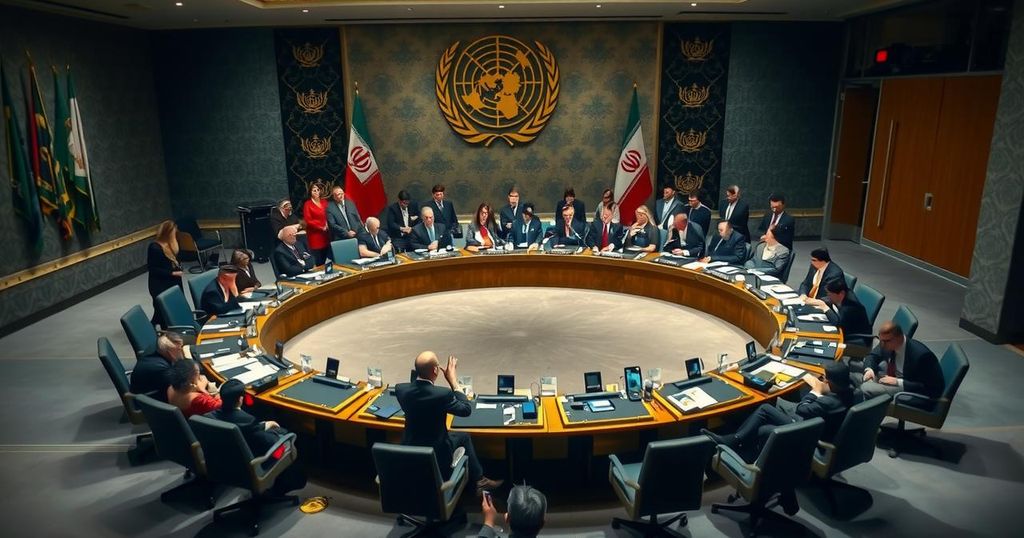Emergency UN Security Council Meeting Amid Rising Tensions Following Israeli Strikes on Iran

The UN Security Council will hold an emergency meeting to address Israel’s recent strikes on Iran, requested by Iran with support from several countries. The situation follows a series of hostilities between Israel and Iranian proxies, raising concerns about regional stability and international peace. Israel claims its actions were successful in diminishing Iran’s military capabilities, while Iraq has raised grievances regarding airspace violations. Moreover, Egypt has proposed a temporary ceasefire in the ongoing Israel-Hamas conflict to facilitate humanitarian aid.
The United Nations Security Council is convening for an emergency meeting to deliberate on recent developments in the Middle East, specifically following Israel’s aerial offensives targeting Iranian missile facilities. This significant meeting was called at Iran’s behest, receiving backing from Algeria, China, and Russia, as noted by the Council’s president from Switzerland. In a formal correspondence to the 15-member Council, Iranian Foreign Minister Abbas Araqchi stated, “Israeli regime’s actions constitute a grave threat to international peace and security and further destabilize an already fragile region.” These Israeli strikes, which occurred on Saturday, were a response to the recent barrage of approximately 200 ballistic missiles fired from Iran towards Israel amid ongoing conflicts involving Iranian-affiliated groups Hamas and Hezbollah within Gaza and Lebanon. Iranian Supreme Leader Ayatollah Ali Khamenei commented on the situation, emphasizing that the consequences of the Israeli strikes should neither be overstated nor understated, while refraining from explicitly advocating retaliation. This marked Israel’s first open military action against its primary adversary. Israeli Prime Minister Benjamin Netanyahu affirmed on Sunday that the operations successfully impacted Iran’s defense capabilities and their missile production capacity. Ahead of the Council’s meeting, Iraq formally filed a complaint with the United Nations, highlighting Israel’s alleged infringement of Iraqi airspace during the strikes against Iran. An Iraqi government spokesperson stated that the correspondence denounces Israel for violating Iraq’s airspace and sovereignty. Further complicating the regional dynamics, Israeli airforce continued strikes on southern Lebanon on Monday, resulting in reports of at least five fatalities in Tyre. Additionally, Egypt’s President Abdel-Fattah el-Sissi put forth a proposal for a two-day ceasefire in the ongoing Israel-Hamas conflict in Gaza, suggesting that the militant group release four hostages during this truce. While this proposal aims to facilitate humanitarian aid for Palestinian civilians in Gaza, immediate responses from both Israel and Hamas have not yet emerged. Moreover, Israeli Mossad chief David Barnea is currently in Doha engaging in discussions alongside Qatari Prime Minister Mohammed bin Abdulrahman Al Thani and U.S. CIA Director William Burns. This backdrop of rising tensions follows a significant escalation initiated by Hamas’s attacks on October 7, 2023, which resulted in the loss of approximately 1,200 Israeli lives and the kidnapping of 250 hostages. Israel’s military response has reportedly claimed nearly 43,000 Palestinian lives, according to figures released by the health ministry in Gaza.
Tensions in the Middle East have significantly intensified due to hostilities between Israel and Iran, aggravated by the prolonged Israel-Hamas conflict. The recent exchanges of military strikes are rooted in ongoing geopolitical rivalries, particularly involving Iranian-backed factions that have engaged in direct confrontations with Israel. The international community is closely monitoring developments as the potential for wider conflict looms. The role of the United Nations Security Council becomes critical in addressing accusations of sovereignty violations and maintaining regional stability amid these disturbances. Egypt’s initiative for a temporary ceasefire underscores a broader call for de-escalation and humanitarian considerations for those caught in the conflict.
The UN Security Council’s emergency meeting underscores the heightened international concern following Israel’s military operations against Iran, which are framed by Iranian officials as violations of global peace and security. The complex web of regional conflicts, marked by Israel’s ongoing fight against Hamas and Hezbollah, further complicates the situation. As the humanitarian crisis in Gaza escalates, efforts for ceasefire and negotiation become increasingly vital. The stringent reactions from affected nations, particularly involving Iraq’s condemnation and proposals for peace from Egypt, reflect the urgent need for diplomatic intervention to restore stability in the region.
Original Source: www.voanews.com






